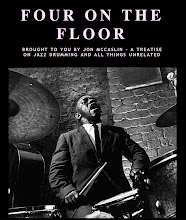Welcome back and I hope you've all been enjoying your turkey and eggnog over the holidays. It's the very last day of the year and therefore this is the last blog post and final Monday Morning Paradiddle column of 2018. Thanks again for your continued support and here's to what was definitely an eventful year and looking ahead ahead to 2019.
So without any further adieu, here's what's shakin' around the Four on the Floor office these days:
- Check out this informative and entertaining new podcast from Chad Anderson, George Sluppick and Robert Barnett entitled The Set Break
- Terry Bozzio interviews Gerry Gibbs at The Drum Channel
- Zildjian cymbal smith Paul Francis interviewed by DRUM! magazine
- A New York Times article feature on the Avedis Zildjian Cymbal Company
- A Before & After listening session with Adam Nussbaum from JazzTimes magazine
- Also from JazzTimes, Bright Moments with Brian Blade and this piece entitled The Place of the Drum Solo in Jazz
- What ever happened to Larry Bunker?
- Jazz warrior Victor Lewis interviewed over at All About Jazz
- Keith Copeland discusses his influences over at Scott K Fish's Life Beyond Cymbals
- An interview with Seattle's Ted Poor, an incredible musician that everyone should know about!
- Thanks again to the frequent and insightful Four on the Floor contributor Tim Mah for sending along this Rolling Stone piece on Chicago's Makaya McCraven
- A great list of recent solo percussion releases to check out from freejazzblog.org (thanks to Jeff Cosgrove for this suggestion)
- The Drum Shuffle offers an interview with Bill Stewart:
And, in case one needed any reminding...
- From Ben Wendel's "Standards with Friends" YouTube series, here is Wendel with Mark Guiliana on Thelonious Monk's "Evidence":
- A short clip of Willie Jones III in action:
- Jim Black playing some very unique (and wobbly!) cymbals:
- A cool piece on the legacy of Blue Note's album artwork:
- Thanks to Rochester's Mike Melito for reminding us via the Facebook to check out Shadow Wilson's drum break on Count Basie's "Queer Street":
- What am I listening to these days?
Eric Reed "Something Beautiful" - Rodney Green (drums)
Duke Ellington "Such Sweet Thunder" - Sam Woodyard (drums)
Elvin Jones "Live at the Lighthouse" - Elvin Jones (drums)
Turboprop "Abundance" - Ernesto Cervini (drums)
McCoy Tyner "Tender Moments" - Joe Chambers (drums)
Miles Davis "In Europe" - Tony Williams (drums)
John Coltrane "Ballads" - Elvin Jones (drums)
- And today's/this year's Final Word goes to Tyshawn Sorey...
"The thing in life I regret most was never having the chance to meet Ornette. But what I will say is this: As one who deals equally with both of these “traditions” (I happen to come from bebop, and have had a great deal of experience learning from the masters, which I still do! And I *still* play this kind of music - even though it’s not what I’m known for doing, given that certain folks view me as “that dude who plays really difficult and weird music all the time...” which is a VERY limited attitude.), sometime what bothers me is when I hear “bebop” played as a style of music. When the opportunity to play a standard comes about, those who indeed have a voice of their own in free/avant-garde settings suddenly become clones - all you hear are regurgitated cliches, pattens, and licks that have been transcribed...just to prove that they can play changes. It becomes an excuse to be creatively lazy and try to sound exactly like the people they have been influenced by...they are no longer “themselves” THROUGH the understanding of that language. There’s a difference between simply playing cliches and finding ways of playing over standards that is personalized, but without trying to play “out.” When one plays cliches, they are playing AT the musicians, and not with them. They’re not TOTALLY in the act of music making.
Say what you wish about Steve Coleman (which is separate from this conversation - given we are discussing MUSIC here) but to me he was one of the people who actually found a way to deal in that music in the most personal, lucid way through his understanding of the masters. Working with him during my tenure taught me that this music, too often, is played as a regurgitated style full of cliches. We need to get past that way of playing (or mocking) the music. You can still “be yourself” while having a well-grounded understanding in that language.
The other thing I will say, however, that the act of performing free/avant-garde music (or whatever you wish to call it) shouldn’t necessarily be one that is only valid once you have “mastered” the bebop language... Bebop is neither a style nor a prerequisite for this kind of expression...though it has greatly informed me very well in so many ways as a musician and composer. I don’t know why people feel that there is harm in dealing with or learning from either of these sub realms of creative music, and then when it comes time to deal with changes or swing, all of a sudden it sounds like a mockery of that music. Be yourself ALL the time, THROUGH your understanding of the language."
- Tyshawn Sorey via the Facebook, November 2018





















No comments:
Post a Comment